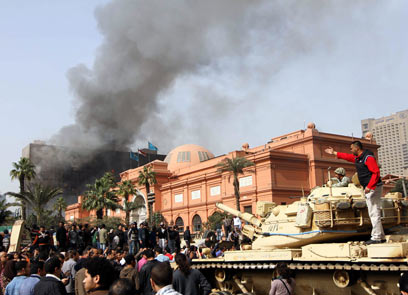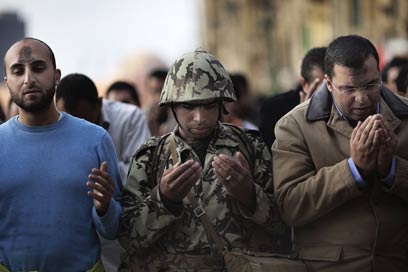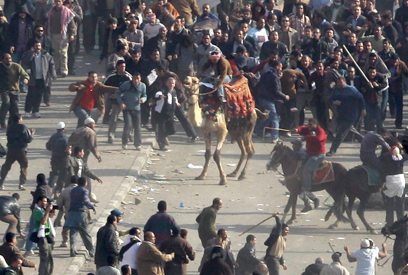
Report: Egyptian army tortured, killed protesters during revolution
The Guardian has reported committee formed by Morsi found army forces – including highest commanders – involved in serious human rights violations during uprising
"This chapter sheds light on new and extremely disturbing incidents that implicate the military in serious human rights violations. In particular, it uncovers new details on one of the most secret aspects of the 18 days of revolt that ended with the ouster of Mubarak."
The report presents "the role played by the armed forces in supporting Mubarak against protesters from the date they were deployed on 28 January 2011, until the first military statement was issued in support of the protesters on 10 February," Hossam Bahgat, the director of the Egyptian Initiative for Personal Rights told The Guardian in a special report revealing unprecedented army involvement in murdering, torturing and kidnapping protesters during the Egyptian uprising.
Related stories:
- Police blamed in Egypt revolt deaths
- Egypt protests on anniversary of Mubarak's fall
- Post-Mubarak Egypt: Utopia turns sour
Ahead of the beginning of Hosni Mubarak's retrial, the British paper The Guardian revealed Wednesday that the Egyptian army took an active part in torture, kidnapping and even killing of protesters during the revolution the led to Mubarak's fall two years ago.
The report was penned by a special committee formed by current Egyptian President Mohamed Morsi mandated to examine crimes undertaken during the revolution.

Protesters in Cairo (Photo: AFP)
According to the Guardian and the report, the Egyptian army was the violent force in the revolution, torturing and killing citizens nation wide – including inside the Egyptian Museum in Cairo – even as military leaders publicly declared their neutrality.
The report, submitted to Morsi in January, has not yet been made public. The chapter attained by the British paper recommends that the Egyptian government investigate the highest echelons of Egypt's armed forces to find those responsible for the atrocities enacted against citizens.
'More than a 1,000 missing'
"The committee found that a number of citizens died during their detention by the armed forces and that they were buried in indigent graves, as they were considered unidentified," the report said, adding that Egyptian authorities have until now failed to investigate, despite evidence of severe torture.

Protesters, soldeirs pray (Photo: AFP)
According to the Guardian, the report's committee further recommends "investigating the leaders of the armed forces about the issuance of orders and instructions to subordinates who committed acts of torture and enforced disappearance."
Since his election in last June, Morsi has refused to prosecute army officers despite numerous claims of protester torturing, disappearance and murder leveled against them, evening go as far as enshrining the army's exclusive right to investigate its soldiers in the country's new constitution.
The Guardian further stated that "more than 1,000 people", including prisoners and citizens alike, are believed to have gone missing during the 18 days of the Tahrir revolution.
Dozens more turned up in Egypt's morgues, The Guardian claims, shot or bearing signs of torture while others have simply disappeared, leaving numerous families completely in the dark in regards to their loved ones whereabouts or status.

Violence in Tahrir (Photo: AP)
In one of the cases the committee investigated, Egyptian soldiers detained an unknown - but likely large - number of civilians at a checkpoint along a highway south of Cairo. None of whom were ever seen again.
Another incident the Guardian reported the committee investigated is a case in which the army detained and tortured protesters in the Egyptian Museum before moving them to military prisons, killing at least one person, in addition to delivering at least 11 unidentified bodies, believed to be former prisoners, to government coroners in the capital only to be buried in indigent graves four months later.
Mohsen Bahnasy, a human rights lawyer and member of the fact-finding committee who spoke to The Guardian, said the military and interior ministry had refused to provide the names of soldiers or officers working at checkpoints, police stations and ad-hoc detention centers where protesters are said to have disappeared. The failure to turn over the names "is an indication of a criminal cover up", Hossam Bahgat, the director of the Egyptian Initiative for Personal Rights, said.
According to the news report, neither the military, interior ministry nor General Intelligence Service – Egypt's top spy agency – provided the committee with any information about civilians allegedly detained. In addition, very few family members came forward.
One woman who testified before the committee, Radia Atta, told The Guardian that her husband, Ayman Issa, went missing after he was held at a roadblock set up along a major desert highway by the military south of Cairo, near the pyramids of Dahshour.
According to Atta, her husband was on his way to work on 30 January 2011, after leaving their home in rural village. According to her, he was probably arrested some time between 7.30am and 8am because of a curfew set by the military.
When Atta arrived at the checkpoint that afternoon in search of him she claims she saw a massive number of detained civilians lying on the ground with their hands and feet tied together. Forces present at the checkpoint told Atta to go to the police station in Giza.
At the station, she saw soldiers beating detainees and violently searching their person upon their arrival from the checkpoint. A soldier gave her her husband's passport and informed her he had been charged with "rioting," and had hence been handed over to the military's prosecutors.
After obtaining permission from the prosecutors to visit her husband, who was now being kept in a large military base with a prison not far from Cairo, he was nowhere to be found. She filed a complaint with defense and interior ministry. Nonetheless, civilian and military prosecutors have failed to find even a shard of evidence regarding her husband's whereabouts.
- Receive Ynetnews updates directly to your desktop










